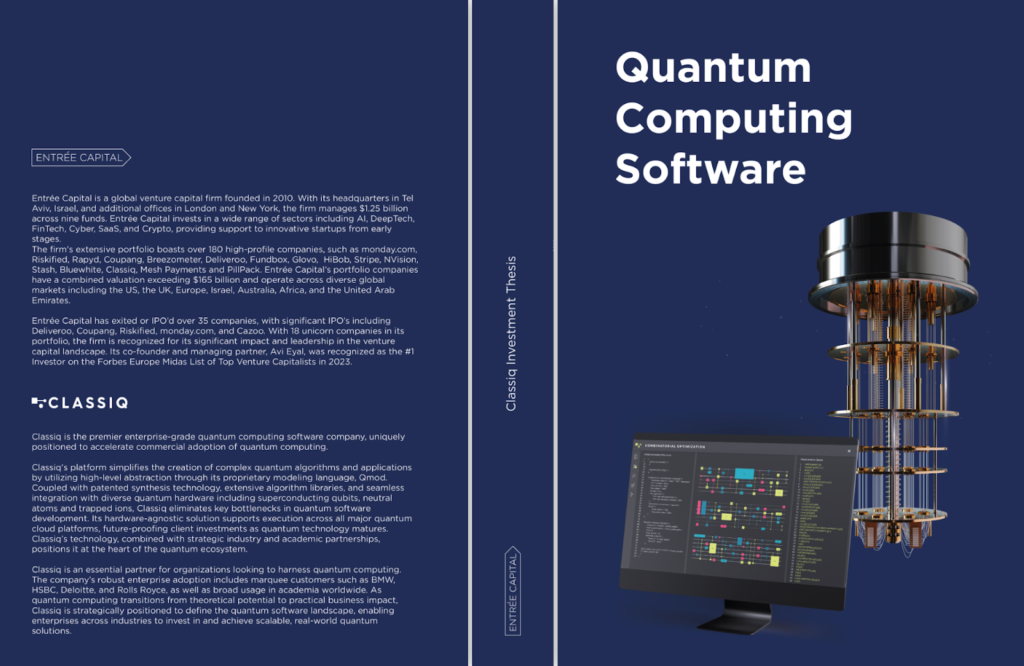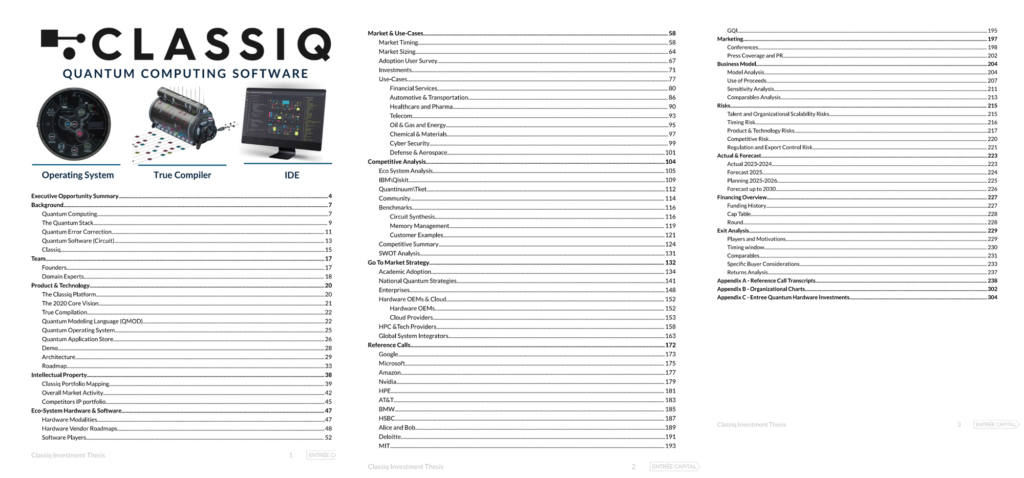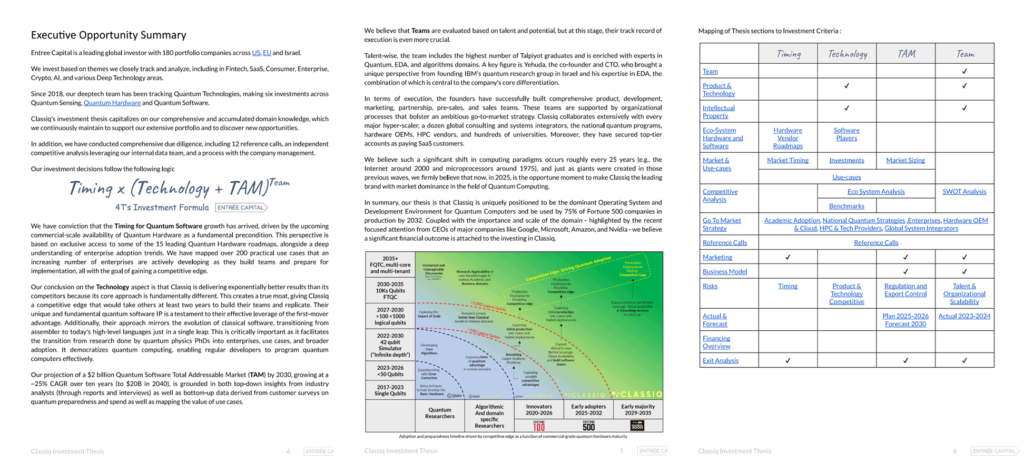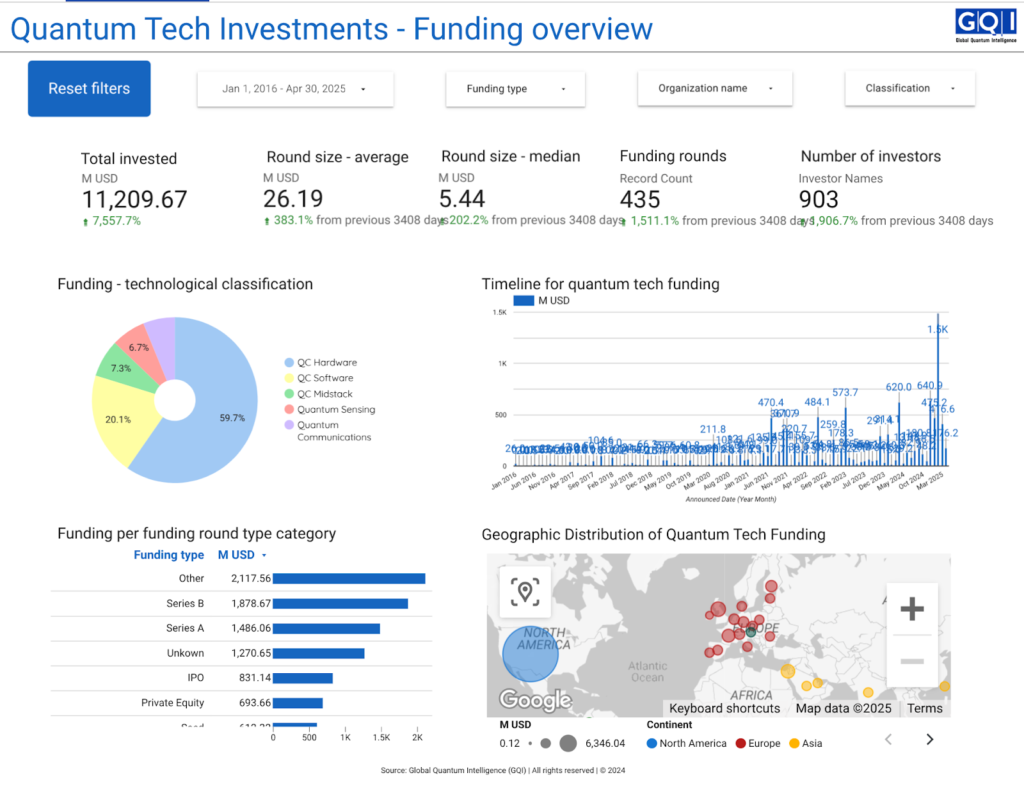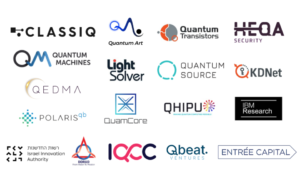Tel‑Aviv‑based Classiq Technologies, a provider of high‑level quantum algorithm design and synthesis tools, has raised US $110 million in a Series C financing that the company says is the largest single funding round for a quantum‑software vendor to date. The new capital brings Classiq’s total funding to US $173 million and extends its runway well into the next phase of noisy‑intermediate‑scale‑quantum (NISQ) commercialisation.
Use of proceeds. Classiq will scale go‑to‑market and customer‑success teams, grow its R&D head‑count, and deepen participation in national quantum‑computing programmes across Asia, the United States and Europe. “We are building the Microsoft of quantum computing,” said co‑founder & CEO Nir Minerbi, pointing to the firm’s 60‑plus patent portfolio and integrations with every major cloud‑QPU provider. “This round empowers our mission to make quantum software accessible to everyone — whether you’re a quantum expert or just getting started. Our technology lets you build once and run anywhere, with state-of-the-art abstraction, scalability, and performance. As the quantum market shifts toward production, we’re seeing a powerful wave of adoption — and we’re here to enable it.”.
Quantum hardware is evolving toward advantage‑class machines with vendor roadmaps eyeing 2026 for first commercial wins. GQI believes that commercial breakthroughs will come starting in 2030 (Early FTQC) and 2035 (Large Scale FTQC). Either way, the landscape is highly fragmented and no architecture looks destined to monopolize. That fragmentation creates a once‑in‑a‑generation opening for a neutral software abstraction layer that lets developers “write once, run anywhere.”
Because standards are still fluid, the first software player to capture developer mind‑share can shape the category — much as Microsoft set the rules for PC software in the 1980s. Value in quantum will accrue at the algorithm and optimisation layer, not merely the qubit layer, and systems integrators plus cloud hyperscalers (AWS, Azure, Google Cloud) are openly shopping for software partners to complete their stacks.
Does this put Classiq into the growing quantum tech unicorn club as the first quantum software vendor? What we can say for sure is that we see growing momentum as we were able to confirm that the round is significantly oversubscribed.
The round was led by multi‑stage VC Entrée Capital – who invested in 7 Quantum deals in the past 6 years and went as far as publishing their 300-page investment thesis in a hardcover book – which committed US $17 million and syndicated the deal with a broad mix of strategics and financial investors, including Norwest Venture Partners, NightDragon, Hamilton Lane, Clal, Neva SGR, Phoenix, Team8, IN Venture (Sumitomo), Wing, HSBC, Samsung Next, and QBeat. Entrée’s deep‑tech partner Ran Achituv — a former founder of the IDF’s Satellite‑Intelligence unit and now General Partner at Entrée — personally orchestrated the syndicate and will retain his board seat at Classiq.
Upon review of the term sheet for this deal we can confidently say that this confirms the trend towards leaders along the stack emerging; who are firmly in control of their destiny. Strategic investors are taking note of this deal and subsequent checks might further extend this round – or future ones Unicorn in the making for sure.
Traction. The company reports that its customer base has tripled year‑on‑year, with “dozens” of Fortune‑scale enterprises and hundreds of academic teams now using its platform. Early lighthouse accounts include Rolls‑Royce, HSBC and the Israel National Quantum Centre. Licence prices range between US $30 000 and US $50 000 per developer seat, with additional metered fees for cloud execution. Classiq claims exceptionally low churn as existing users expand seat counts.
Over the next five years, Classiq is well positioned to become the default “mid‑stack” layer that bridges high‑level algorithm design and low‑level qubit control. Its closest competitors today are a mix of open‑source toolkits (IBM’s Qiskit, Google’s Cirq) and a handful of venture‑backed start‑ups (Quantinuum’s TKET, Pasqal‑Qu&Co’s Pulser). Classiq’s constraint‑based synthesis engine, hardware‑agnostic abstraction, and expanding patent wall give it a defensible moat that should widen as hardware scales from ~100 noisy qubits today to the >1 000 “error‑mitigated” qubits expected by 2029.
GQI market modelling indicates that the mid‑stack segment will be one of the fastest‑growing layers in the quantum value chain, expanding at a ~50 % CAGR to exceed US $2 billion in annual software spend by 2030. If Classiq maintains its current technology lead and converts a projected 40 % of its 40+ Fortune‑grade pilots into multi‑year enterprise contracts, it could capture a double‑digit market share and establish itself as the de‑facto development standard. This trajectory would support optionalities ranging from IPO readiness to a strategic acquisition by a full‑stack provider seeking differentiation at the software layer.
Market context. The raise lands seven months after Australia’s Q‑CTRL expanded its Series B to US $113 million and underscores continuing investor appetite for mid‑stack software layers that abstract the hardware heterogeneity of quantum processors. Entrée Capital, which manages US $1.6 billion across nine funds and counts 17 unicorns in its portfolio, has backed Classiq since seed and views compiler‑layer tooling as the first scalable revenue pool once error‑corrected qubits exceed the 1 000‑qubit threshold.
Global Quantum Tech Investment Trends. Over the past four years, roughly two‑thirds of the ~US $11 billion in disclosed private quantum funding has flowed into hardware developers at Series B and beyond. Classiq’s nine‑figure Series C, squarely in the software mid‑stack, signals a capital rotation toward layers that can monetise before large‑scale fault‑tolerant machines arrive. In a higher‑interest‑rate, valuation‑sensitive climate, investors appear more willing to back asset‑light platforms with clear SaaS or cloud‑consumption revenue, while reserving megacheques for hardware only when defensible differentiation is evident. For startups, that means emphasising near‑term commercial traction and capital efficiency; for investors, it broadens the quantum thesis beyond qubits to include the tools that let enterprises extract value from today’s NISQ‑era devices.
Impact on Israel. This record‑setting Series C places Israel firmly on the short list of nations shaping the commercial quantum era, especially in light of Quantum Machines raise of $170M just a few short weeks ago. With government support through the Israel National Quantum Initiative and a dense talent pool that spans the IDF’s elite technology units and research groups at Tel‑Aviv, Technion, and Hebrew universities, Classiq’s success becomes an anchor and talent magnet for the local ecosystem. The raise signals to global investors that Israeli quantum start‑ups can scale beyond seed and Series A, and it sets valuation benchmarks that will help peers such as LightSolver, Quantum Art, and Quantum Transistors secure growth capital. Over the next five years we expect a reinforcing flywheel: Classiq’s customer wins and patent portfolio will attract specialised suppliers, while its board‑level ties to multinational LPs (HP Enterprise, NTT, Samsung) will funnel both capital and market access back into Israel, elevating the country’s competitiveness against larger U.S., EU, and Chinese clusters.
The full press release is available here and the lead investor Ran Achituv can be contacted at quantum@entreecapital.vc.
May 12, 2025


